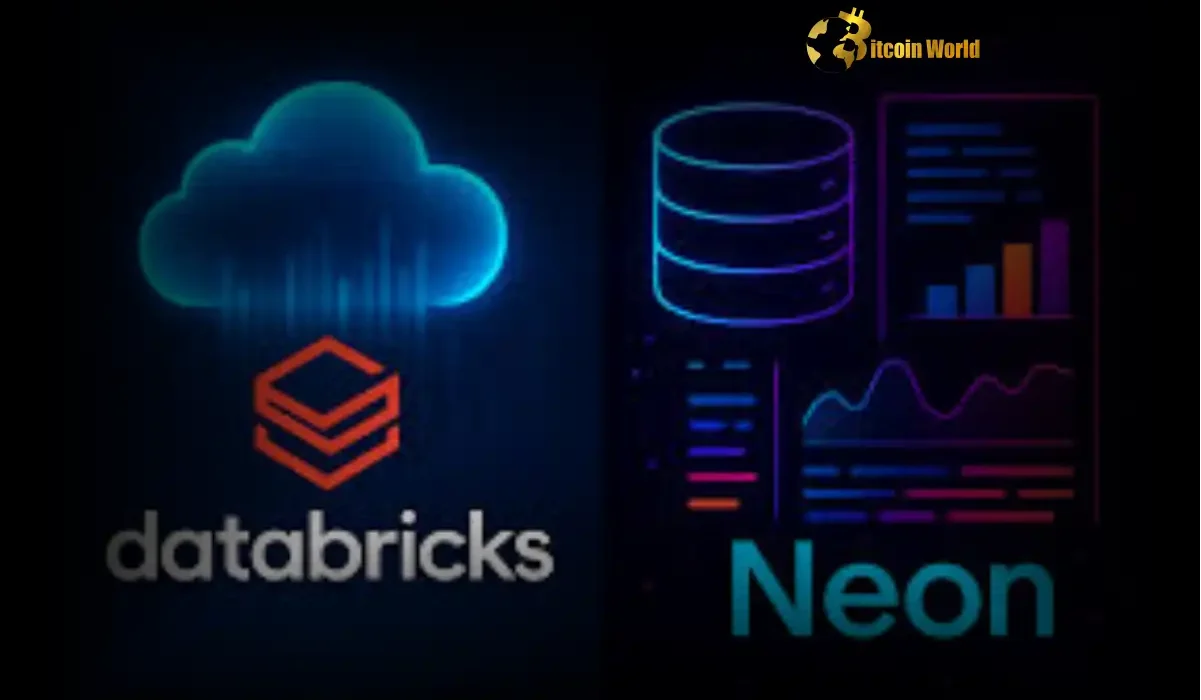In a move signaling the increasing importance of scalable data infrastructure for AI, data analytics giant Databricks has announced a significant Databricks acquisition. The company confirmed on Wednesday its agreement to acquire Neon, a startup specializing in open source database technology, for approximately $1 billion.
This acquisition brings Neon’s innovative serverless relational database management system under the Databricks umbrella. The strategic goal is to integrate Neon’s technology with Databricks’ existing data intelligence services, enabling customers to deploy and manage AI agents more efficiently and cost-effectively.
What is the Neon Database and Why is it Important?
Founded in 2021, Neon has quickly established itself as a notable player in the cloud database space, offering an open source database platform designed as a serverless alternative to services like AWS Aurora Postgres. The Neon database provides a managed cloud-based solution with flexible pricing, including free and usage-based paid plans.
Key features of the Neon database include:
- Serverless Architecture: Automatically scales compute, memory, and storage based on demand.
- Branching: Allows developers to create isolated database instances for testing and development, similar to code branching.
- Point-in-Time Recovery: Enables easy restoration of data to a specific moment.
- Cloning: Facilitates quick duplication of databases for various workflows.
These capabilities make the Neon database particularly well-suited for modern, dynamic workloads, especially those driven by automation and artificial intelligence.
How Does This Acquisition Benefit AI Agents?
Databricks highlights that Neon’s features are ideally aligned with the demands of workloads run by AI agents. These agents operate at speeds far exceeding human interaction and often require the ability to rapidly provision, manage, and tear down database instances for tasks like testing, analysis, or generating specific outputs.
According to Databricks, recent data from Neon’s platform shows that a significant majority — 80% — of databases provisioned on Neon were created automatically by AI agents rather than by human developers. This telemetry underscores the growing trend towards agent-driven application development.
Ali Ghodsi, co-founder and CEO of Databricks, emphasized this point, stating, “The era of AI-native, agent-driven applications is reshaping what a database must do. Neon proves it: four out of every five databases on their platform are spun up by code, not humans.”
By integrating Neon, Databricks aims to provide developers with a serverless Postgres solution that can keep pace with the speed and scale required by AI agents, while also offering pay-as-you-go economics and leveraging the robustness of the Postgres community.
Databricks’ Strategy and Investment in AI
This Databricks acquisition of Neon for approximately $1 billion is the latest in a series of significant investments the company has made to solidify its position in the AI and data management market. With substantial financial backing, including over $19 billion raised and a $62 billion valuation earlier this year, Databricks has been actively expanding its capabilities through strategic acquisitions.
Recent notable deals include the reported acquisition of data management company Tabular for nearly $2 billion in June 2023 and the purchase of MosaicML, an open source database platform for training large language models, for $1.3 billion in 2023.
These moves demonstrate Databricks’ commitment to building a comprehensive platform for the entire AI lifecycle, from data preparation and model training to deployment and management, now significantly enhanced by Neon’s serverless Postgres expertise tailored for automated workloads.
What This Means for the Future of Databases and AI
The integration of Neon’s serverless Postgres technology into the Databricks platform is expected to accelerate the development and deployment of AI-native applications. Developers using Databricks will gain access to a highly scalable and flexible database solution optimized for the unique patterns of AI agents.
This acquisition also highlights the increasing demand for specialized database solutions that can handle the dynamic and often ephemeral nature of AI workloads. The trend towards automated database provisioning by code, as seen on Neon’s platform, suggests a future where data infrastructure is even more tightly integrated with application logic and AI workflows.
The combination of Databricks’ data intelligence capabilities with Neon’s cutting-edge open source database technology promises to offer a powerful new toolset for building the next generation of AI-driven applications.
To learn more about the latest AI market trends, explore our article on key developments shaping AI features.
Disclaimer: The information provided is not trading advice, Bitcoinworld.co.in holds no liability for any investments made based on the information provided on this page. We strongly recommend independent research and/or consultation with a qualified professional before making any investment decisions.


